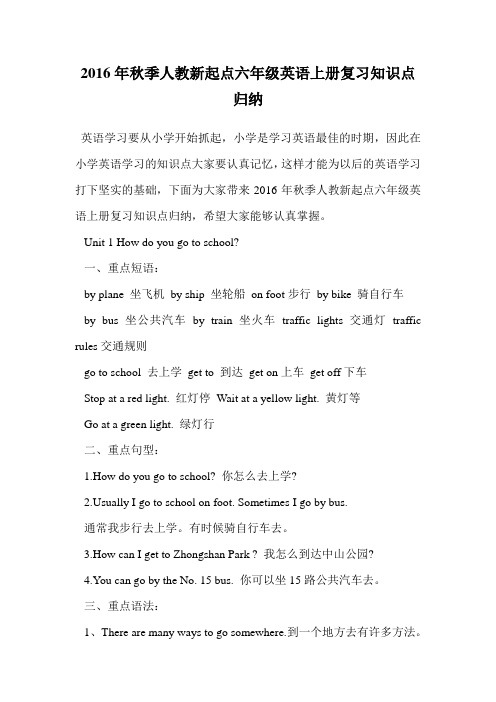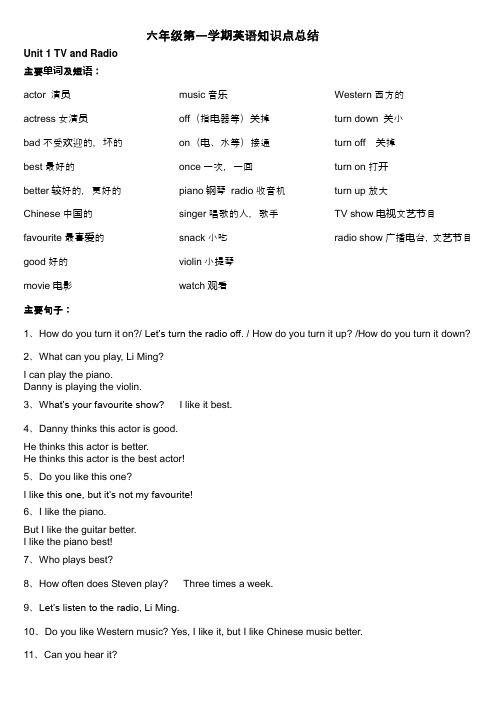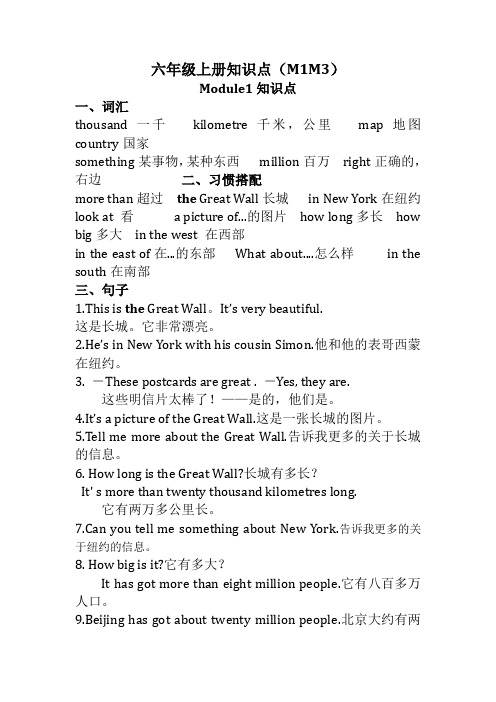(新版)新起点小学英语六年级上册知识点复习提纲
2016年秋季人教新起点六年级英语上册复习知识点归纳.doc

2016年秋季人教新起点六年级英语上册复习知识点归纳英语学习要从小学开始抓起,小学是学习英语最佳的时期,因此在小学英语学习的知识点大家要认真记忆,这样才能为以后的英语学习打下坚实的基础,下面为大家带来2016年秋季人教新起点六年级英语上册复习知识点归纳,希望大家能够认真掌握。
Unit 1 How do you go to school?一、重点短语:by plane 坐飞机by ship 坐轮船on foot步行by bike 骑自行车by bus 坐公共汽车by train 坐火车traffic lights 交通灯traffic rules交通规则go to school 去上学get to 到达get on上车get off下车Stop at a red light. 红灯停Wait at a yellow light. 黄灯等Go at a green light. 绿灯行二、重点句型:1.How do you go to school? 你怎么去上学?ually I go to school on foot. Sometimes I go by bus.通常我步行去上学。
有时候骑自行车去。
3.How can I get to Zhongshan Park ? 我怎么到达中山公园?4.You can go by the No. 15 bus. 你可以坐15路公共汽车去。
三、重点语法:1、There are many ways to go somewhere.到一个地方去有许多方法。
这里的ways一定要用复数。
因为there are是There be句型的复数形式。
2、on foot 步行乘坐其他交通工具大都可以用介词by,但是步行只能用介词on 。
4、go to school的前面绝对不能加the,这里是固定搭配。
5、USA 和US 都是美国的意思。
另外America也是美国的意思。
6、go to the park 前面一定要加the. 如果要去的地方有具体的名字,就不能再加the ,如果要去的地方没有具体名字,都要在前面加the. ( go to school除外。
六年级英语上册知识点总结

六年级第一学期英语知识点总结Unit 1 TV and Radio主要单词及短语:actor 演员actress女演员bad不受欢迎的,坏的best最好的better较好的,更好的Chinese中国的favourite最喜爱的good好的movie电影music音乐off(指电器等)关掉on(电、水等)接通once一次,一回piano钢琴radio收音机singer唱歌的人,歌手snack小吃violin小提琴watch观看Western西方的turn down 关小turn off 关掉turn on打开turn up放大TV show电视文艺节目radio show广播电台,文艺节目主要句子:1、How do you turn it on?/ Let’s turn the radio off. / How do you turn it up? /How do you turn it down?2、What can you play, Li Ming?I can play the piano.Danny is playing the violin.3、What’s your favourite show?I like it best.4、Danny thinks this actor is good.He thinks this actor is better.He thinks this actor is the best actor!5、Do you like this one?I like this one, but it’s not my favourite!6、I like the piano.But I like the guitar better.I like the piano best!7、Who plays best?8、How often does Steven play? Three times a week.9、Let’s listen to the radio, Li Ming.10、Do you like Western music? Yes, I like it, but I like Chinese music better.11、Can you hear it?12、Why is the radio playing Chinese music?13、Thanks for finding this radio show.14、Dinosaurs and people are different. I think dinosaurs and people are the same.15、What did you like best?I liked the dinosaur better than the rabbit, but I liked the snacks best.16、They order some food.17、Jenny wants Western food. “I would like a hamburger, French fries and milk, please.”18、I would like some Chinese food, please. I would like some noodles, dumplings and tea.19、There are many people at the restaurant.20、I can’t hear her. I can’t hear her either.重点语法复习:绝大多数形容词有三种形式,原级,比较级和最高级, 以表示形容词说明的性质在程度上的不同。
六年级上册英语必背知识点

六年级上册英语必背知识点
以下是六年级上册英语的一些必背知识点:
1. 词汇:掌握六年级上册课本中的所有词汇,包括名词、动词、形容词等各类实词和虚词。
2. 语法:掌握简单句的基本结构,理解并运用一般现在时、一般过去时、一般将来时等时态。
3. 日常用语:掌握课本中出现的日常用语,能够在实际生活中运用。
4. 阅读理解:提高阅读速度和理解能力,能够理解简单的英文文章。
5. 写作:能够根据要求写出简单的英文短文,注意语法和拼写错误。
6. 听力:提高英语听力水平,能够听懂简单的英语对话和短文。
7. 口语:能够流利地与他人进行英语对话,表达清晰、准确。
8. 文化知识:了解一些基本的英美文化知识,提高跨文化交际能力。
9. 学习方法:掌握有效的英语学习方法,如多听、多说、多读、多写等。
10. 学习态度:培养积极的学习态度,如勤奋、认真、细心等。
以上是六年级上册英语的一些必背知识点,希望对您有所帮助。
六年级上册英语素材 全册重点内容总结 人教版新起点(完整版)

【精品】2014人教版新起点小学英语六年级上册重点内容(完整版)Unit 1一、单词表morning tea 早茶soup 汤garden 花园the Potala Palace布达拉宫the Summer Palace 颐和园The Terracotta Army 兵马俑vacation 假期taste 品尝map 地图north 北south 南east 东west 西famous 著名的temple 寺around 遍及the Yangtze River 长江foggy 有雾的spicy 辣的silk 丝绸forest 树林stone 石头二、重点单词及句子What can you see in the pictures? 你在图片里能看到什么?Guangzhou 广州morning tea, soup 早茶,汤Lhasa 拉萨the Potala Palace 布达拉宫Beijing 北京the Summer Palace 颐和园Suzhou 苏州garden 园林Xi'an 西安the Terracotta Army 兵马俑Where did you go on your summer vacation? 你暑假去哪了?I went to Guangzhou with my parents. 我和父母一起去了广州。
What did you do there? 你在那里做了什么?We ate seafood, had morning tea and tasted soup. 我们吃了海鲜,早茶和汤。
三、重点词组及例句(来源于本单元)go on your summer vacationeg、Where did you go on your summer vacation? 你暑假去哪了?eat seafood海鲜have morning tea早茶have tasted soupeg、We ate seafood, had morning tea and tasted soup. 我们吃了海鲜,早茶和汤。
最新(新版)新起点小学英语六年级上册知识点复习提纲

Red Square
Tokyo
Japan
Asia
Japanese
Tokyo tower
Toronto
Canada
North America French and English CN Tower
Cairo
Egypt
Africa
?
the pyramids
二、句型。
1. Where would you like to go this winter vacation? I’d like to go to Beijing.
Chinese
1864-1957
painted shrimps
Hans Andersen a writer
Danish
1805-1875
wrote stories for children
Beethoven
a musician German
1770-1827
composed music
Thomas Edison an inventor American
invent a small plane
What will the future be like in 50 years?
There will be
no wars. more peace. more cars. no pollution.
take trips to Mars.
eat pills for meals
Europe
French
the Eiffel Tower
New York America North America English
the Disneyland
Sydney
小学六年级英语上册知识点整理

小学六年级英语上册知识点整理1.语法知识点- 时态:一般现在时、一般过去时、一般将来时- 句型:陈述句、疑问句、否定句、祈使句- 提问:特殊疑问词的使用(What。
Where。
When。
Why。
Who。
Whose。
How等)- 动词:动词的基本形式、动词的过去式、动词的进行时- 名词:可数名词、不可数名词、单数形式和复数形式的变化- 形容词:形容词的基本形式、形容词的比较级和最高级- 副词:副词在句中的位置- 介词:常用介词的使用(in。
on。
at。
by。
with等)- 冠词:冠词的使用(a。
an。
the)- 连词:and。
but。
or的使用2.词汇知识点- 数字:1-100的基本数字表达,以及相关的算术运算词汇- 天气:常见的天气词汇(sunny。
rainy。
windy等)- 季节:春、夏、秋、冬四个季节的英文表达- 颜色:常见的基本颜色词汇(red。
blue。
green等)- 学科:英语、数学、音乐等学科的英文表达- 动物:常见的动物名称(dog。
cat。
bird等)- 蔬菜和水果:常见的蔬菜和水果名称(carrot。
apple。
banana 等)- 地点:常见的地点名称(school。
park。
supermarket等)- 人物:常见的人物角色(teacher。
student。
friend等)3.日常用语知识点- 问候与回应:常用的问候语和回应语(Good morning。
How are you?等)- 自我介绍:自我介绍的基本句型和常用词汇- 家庭成员:家庭成员的英文表达(father。
mother。
brother等)- 个人信息:年龄、姓名、国籍等个人信息的英文表达- 时间:表达时间的基本句型和常用词汇(hour。
minute。
o'clock等)- 打电话用语的基本句型和常用词汇- 交通工具:常见的交通工具名称(bus。
car。
bike等)- 食物和饮品:常见的食物和饮品名称(rice。
知识点(Module1-3)(知识清单)英语六年级上册

六年级上册知识点(M1M3)Module1知识点一、词汇thousand一千kilometre千米,公里map 地图country国家something某事物,某种东西million百万right正确的,右边二、习惯搭配more than超过the Great Wall长城in New York在纽约look at 看 a picture of...的图片how long多长how big多大in the west 在西部in the east of在...的东部What about....怎么样in the south在南部三、句子1.This is the Great Wall。
It’s very beautiful.这是长城。
它非常漂亮。
2.He’s in New York with his cousin Simon.他和他的表哥西蒙在纽约。
3. -These postcards are great . -Yes, they are.这些明信片太棒了!——是的,他们是。
4.It’s a picture of the Great Wall.这是一张长城的图片。
5.Tell me more about the Great Wall.告诉我更多的关于长城的信息。
6. How long is the Great Wall?长城有多长?It' s more than twenty thousand kilometres long.它有两万多公里长。
7.Can you tell me something about New York.告诉我更多的关于纽约的信息。
8. How big is it?它有多大?It has got more than eight million people.它有八百多万人口。
9.Beijing has got about twenty million people.北京大约有两千万人口。
2023年小学六年级英语上册总复习资料

2023年小学六年级英语上册总复习资料一、听力练
- 学生可以通过听录音来提高听力技能。
- 可以使用英语歌曲和儿童故事CD来训练听力。
- 在听力练中,强化对标准发音和语速的理解。
二、口语练
- 学生可以通过与同学进行英语口语对话来提高口语表达能力。
- 参加英语角活动,积极参与英语对话练。
- 创造外语环境,多与家人和朋友进行英语交流。
三、阅读理解
- 学生可以通过大量阅读英语文章来提高阅读理解能力。
- 多阅读英语故事书、儿童杂志和英语新闻。
- 注意理解关键词,提炼文章主旨。
四、写作训练
- 学生可以通过写作来提升英语写作能力。
- 练写日记、写信、写作文等。
- 注意语法、拼写和表达的准确性。
五、语法规则
- 学生需要掌握基本的英语语法规则。
- 研究动词的时态、主谓一致、名词单复数等。
- 参考英语语法书籍进行研究和巩固。
六、单词记忆
- 学生需要积累和记忆大量的英语单词。
- 利用单词卡片、应用程序等进行记忆。
- 多进行单词拼写和词汇运用的练。
以上是2023年小学六年级英语上册总复习的一些资料和建议,希望对学生们复习英语有所帮助。
祝大家学业进步!。
- 1、下载文档前请自行甄别文档内容的完整性,平台不提供额外的编辑、内容补充、找答案等附加服务。
- 2、"仅部分预览"的文档,不可在线预览部分如存在完整性等问题,可反馈申请退款(可完整预览的文档不适用该条件!)。
- 3、如文档侵犯您的权益,请联系客服反馈,我们会尽快为您处理(人工客服工作时间:9:00-18:30)。
义务教育基础课程小学教学资料新起点小学英语六年级(上)复习纲要Unit 1 In China.一、词汇。
景点(写法+所处的省份)+城市(写法+所处的省份+所处的方位)+方位(写法)Yellow Mountain Anhui province southElephant Trunk Hill Guangxi province souththe Stone Forest Yunnan province souththe Shaolin Temple Henan province eastthe Potala Palace Tibet(Lhasa)westthe Mogao Caves Gansu province westThe warriors Shaanxi province (Xi’an) westMount Tai Shandong province eastMount Emei Sichuan province west/southChinese tea and silk Zhejiang province (Hangzhou) southHarbin Heilongjiang province northWuhan Hubei province south二、句型。
1. Where is Harbin? It’s in Heilongjiang province. It’s in the north of China.Where is Yellow Mountain? It’s in Anhui province. It’s in the south of China.2. What is Beijing famous for? It’s famous for the Great Wall.三、写作:介绍一座你熟悉的中国城市。
【例文】Beijing is a famous city in China. It’s the capital of China. It’s in the north of China. It’s famous for the Great Wall. I love Beijing.Unit 2 Around the world一、词汇。
6大洲(写法)+国家(写法+所处的大洲)+语言(写法)Beijing China Asia Chinese the Great Wall/the Forbidden City Paris France Europe French the Eiffel TowerNew York America North America English the DisneylandSydney Australia Oceania English the Opera HouseMoscow Russia Europe and Asia Russian Red SquareTokyo Japan Asia Japanese Tokyo towerToronto Canada North America French and English CN Tower Cairo Egypt Africa ? the pyramids二、句型。
1. Where would you like to go this winter vacation? I’d like to go to Beijing.2. What do you know about Beijing? It’s in China. China is in Asia.What language do people speak there? People there s peakChinese.三、写作:介绍一座你熟悉的外国城市。
【例文】Tokyo is a city in Japan. Japan is in Asia. It’s famous for Tokyo tower. People there speak Japanese.I’d like to go to Paris. Paris is a city in France. France is in Europe. It’s famous for the Eiffel tower. People there speak French.Unit 3 Animal World一、词汇。
动物种类+动物名称+(重量、长度)单位(复数时要加s)二、句型。
1. (复数)What kind of animal are monkeys? They are mammals.(单数)What kind of animal is a monkey? It’s a mammal.2. How tall is the giraffe? It’s five meter s tall.How fast is the ostrich? It’s 70 kilometer s an hour.How heavy is the elephant? It’s four ton s.3. as…as…像……一样……A hummingbird is as small as a thumb.An ostrich can run as fast as a car.A giraffe is as tall as a tree.A whale is as heavy as 25 elephants.三、写作:介绍一种你熟悉的动物。
【例文】I like ostriches. They’re birds. They are tall. They have strong legs and wings. They can run as fast as a car.I like elephants.They are mammals. They are five tons. They are four meters tall.They are the biggest animal on land.Unit 5 Feelings一、词汇。
1. 八个情绪词汇(与情绪有关的事件):nervous, happy, sad, excited, angry, worried, proud, surprised2. 动词过去式:make-made; win-won; give-gave; lose-lost; come-came; draw-drew; bite-bit; say-said; take-took; get-got; is/am-was; are-were3. 一个连词:because二、句型。
1. How are you? I am nervous. Why? I am going to sing in front of my class.2. You look surprised. Why? I am surprised because Andy came.三、写作:写一篇心情日记。
【例文】Date: December 16Rating:☆☆☆Dear Diary,Today was a great day. I was proud because I got an A on my English test.This morning, I forgot my homework. My teacher looked angry. But he is friendly to us.Unit 6 Famous People一、词汇。
名字Name 职业Job 国籍Nationalities 生卒年be born/died 成就achievementsMei Lanfang an actor Chinese 1894-1961 s a ng Beijing opera sQi Baishi an artist Chinese 1864-1957 paint ed shrimp sHans Andersen a writer Danish 1805-1875 wr o te stories for child ren Beethoven a musician German 1770-1827 compose d musicThomas Edison an inventor American 1847-1931 invent ed the light bulbNie Er a musician Chinese 1912-1935 compose d national anthemXu Beihong an artist Chinese 1895-1953 paint ed horse sLi Bai a poet Chinese 701-762 wr o te many poem sHelen Keller a writer American 1880-1968 wr o te many book s二、句型: 1.Who is this? 2. What did he do? 3. When was he born? 4. Why is he famous?三、写作:介绍一位名人。
【例文】This is Mei Lanfang. He was an actor. He was Chinese. He was born in 1894. He is famous because he s ang Beijing operas. (He died in 1957.)This is Helen Keller. She was a writer. She was American. She was born in 1880. She is famous because she wrote many books. (She died in 1968.)Unit 7 The future一、词汇+句型What will you be in the future?a professor.a detectiveI will be a principalan astronauta presidentWhere will you live in the future?on the sun will+动词的原形on the moonon the cloudI will live in a house on the oceanon the earthon Marsin Beijingin ChangchunWhat will you do in the future?travel all over the world.I willtake trip s to Mars by spaceship.invent a small planeWhat will the future be like in 50 years?no wars.more peace.There will be more cars.no pollution.take trips to Mars.eat pills for mealsPeople will live on Mars.go to work by plane.work at home.Robots will do housework for us.二、写作:介绍未来。
